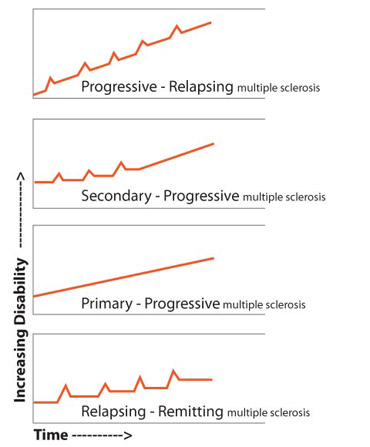What is MS? Part 2
You've reached What is MS? Part 2. If you arrived here first and want to read the first part, click here.
Now we know
With a definite diagnosis, we now had the answer to all those nagging symptoms that just wouldn't go away. We still didn't have a complete and definitive answer to the question - what exactly is MS? At the very least, we had a reason why he felt the way he did.
Things went on as "normal" for quite a few years after his diagnosis. Cir continued working and taking martial arts classes. He worked at a vitamin store and had learned by reading and occasionally talking to others, which vitamins were good for the nervous system. He began taking a B 100 vitamin, as well as other herbs to help stave off the effects that were said to come as a result of MS.
Here's a short animation video that explains what happens to the nervous system when you have MS.
A What is MS animation video
Educating ourselves
When I found out Cir had multiple sclerosis, I immediately got every single book the library had about the disease. I read them from cover to cover and then read them again to him. I read the clinical books. I read memoirs and even fictional books about people with MS.
We figured out on our own that he probably had "RR" or relapsing-remitting multiple sclerosis. About 85% of people who are diagnosed with MS, start out with RRMS. In this form of MS, symptoms come and go without much progression. Each relapse is followed by a recovery. This can be a full recovery or a partial recovery resulting in a very slow or no progression.
Another thing we learned was that multiple sclerosis is a chronic illness, meaning that it will last for a long time, most likely for the rest of your life. Once you develop MS, it will not go away. It is also progressive, meaning that it continuously gets worse or more severe over time. Some may use the term, chronic progressive MS or CPMS. This, however, is not a true description of the disease.
Around the year 2000, Cir had progressed to the point where he could no longer work. It was very difficult for him to walk without a cane, walker, or a wheelchair. He went from RRMS to SPMS or secondary progressive MS. This was a drastic, though not totally devastating, change in our lives. We basically had to start over with learning what MS was for someone with this type of multiple sclerosis.
Click the link to read more about the different Types of MS.
Overcoming fears
Multiple sclerosis usually affects young, productive adults during their working years. Because of this, the disease may cause many people to fall into depression when they can no longer work. I was so afraid of what was going to happen to us.
And I'm sure Cir's feelings were magnified even more so because he had a family to support. Depression became a major issue that neither of us talked about or wanted to accept. Thankfully, we drew closer together instead of pulling apart. Gradually we were able to overcome our individual feelings of depression as well as our fears for the future.
In spite of ms
Cir's experience, although not unique, is what you will find within the pages of this website. If you are new to this disease and have asked yourself the question - What is MS? - we hope you'll find the answer to this question as well as many others, here. Your symptoms may be different, milder or maybe even worse.
You may be younger or older. You may be a woman. You may know someone who has this unpredictable disease and who's also trying to figure out what will happen to them as a result. By all means, send them here. The one thing we want you and everyone who knows someone with this disease to know is that in spite of having a chronic condition like multiple sclerosis, life is still worth living.
You just need to take a different approach to how you do things.
A life worth living
MS has so many different faces. Cir sometimes describes it as a "MonSter", a "MyStery", or "the perfect disease". He feels it is a demon that needs to be conquered. That's how he approaches it. You may think of it in a totally different way.
No matter how you see it or feel about it, life is still definitely worth living. Everyday we search for ways to make living a life with MS just a little bit easier. One day soon, hopefully we'll all know the answer to the question - what is MS?
And until then, lets support each other until they find a cure.
How do you answer the question, "What is MS?" Here is Cleveland Clinic's answer to that question. (Link will open a new window). And if you'd like to share with us and our visitors how you explain what multiple sclerosis is, use the form below to add your page.
How do you answer when people ask you - What is MS? We'd love to hear it. Add your definition in the form below.
Do you have a ready answer when someone asks you, "What is MS? or Are you one of Jerry's kids?"
We'd love to hear how you reply.
And so would our visitors.
Go from Part 2 back to What is MS.
Dear Friends,
"Life in Spite of MS is a participant in the Amazon Services LLC Associates Program, an affiliate advertising program designed to provide a means for sites to earn advertising fees by advertising and linking to Amazon.com. We're also part of the Ebay Partner Network, another affiliate program."
We'd also like you to know it doesn't cost one cent more when you click through the links here on our blog. Not one single penny. And we will make a little extra cash when you do click through. We'll be ever so appreciative. You also have our word that we'll only link to things that we would use ourselves, (or wish we could have or use).
Sincerely,
Cir & Akrista
You are reading original content written by Akrista or Cir L'Bert of Life in Spite of MS. If you enjoyed reading this blog, please consider following us on Facebook, Twitter, Pinterest, and Instagram. See you there!
Privacy Policy ~ Advertising Policy ~ Disclaimer ~ Contact Us ~ About Us





New! Comments
Have your say about what you just read! Leave me a comment in the box below.